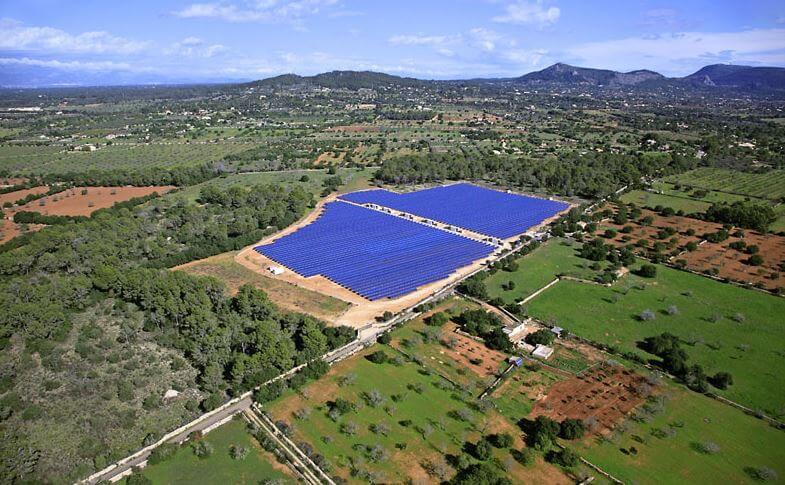Source: PV-Magazine Date: February 26th, 2018

Blasting the Spanish Government for its lack of renewables action, the Balearic Government has today issued an ambitious Climate Change Law designed to kick start a renewable energy transition on the four islands of Mallorca, Menorca, Ibiza and Formentera. Overall, it aims to cover 100% of energy demand with renewables by 2050. 230 MW of solar PV are alerady in the pipeline.
In response to a still heavy dependence on fossil fuels, and frustrated by the lack of action on behalf of the national Spanish Government, the regional Balearic Government has proposed a new Climate Change Law, aimed at creating a sustainable tourist destination and boosting local employment.
Joan Groizard Payeras, a departmental director-general with the Balearic government, tells pv magazine that the draft has been opened up to public participation and suggestions today. Meanwhile, by this summer, it is expected to receive government approval, before it is sent to the regional parliament. Final approval is expected by this December, or January 2019.
100% renewables
Under the law, the regional government intends to meet the energy demands on Mallorca, Menorca, Ibiza and Formentera with 10% renewables by 2020, 35% by 2030 and 100% by 2050.
It will also: be required to create regular five-year plans describing how these goals will be met; introduce binding emissions targets for businesses; and work towards attaining a 2%electric vehicle hire fleet by 2020, and 100% by 2035.
At 2%, or around 80 MW, solar PV currently represents the majority of renewable energy installed in the Balearics. The government aims to make it compulsory for all existing car parks with an over 1000 m2 surface area to install solar PV by 2025; and for all new builds with similar surface areas – hospitals and supermarkets, for example – after 2020 to incorporate PV.
Groizard Payeras adds that there is currently around 230MW of solar PV in the development pipeline, which would be enough to take solar’s current 2% share to 10% by 2020.
“In terms of large projects, the Law establishes that the Island Councils of each of the 4 islands have to determine the zones where renewables can be installed. They get to choose which technologies, but the expectation is that all of them will apply solar PV, and potentially Menorca will also include wind. Because visual impact is a big deal here, wind has not been very popular – there is also a perception (incorrect, in my personal opinion!!) that tourists will not like to see wind projects here and that it would be bad for tourism,” he says.
Using the ‘Danish’ approach, community renewable energy will also be a focus, with residents invited to invest directly in projects. For instance, projects over 5 MW will be required to be open to residents of the same, or neighboring, municipalities. Meanwhile, there is a proposal for self-consumption installations to be shared between different users.
An independent expert committee will be formed to oversee the development of the energy transition, specifically in terms of meeting legal requirements, and recommending any necessary policy measures.
“Given the slow progress of climate legislation nationally, and the existence of national policies that conflict with emission reductions, this regional law will provide a progressive and ambitious example for other regional governments of the 17 autonomous communities of Spain to follow,” reads a statement issued.
Fossil’s dominance
According to statistics from Red Eléctrica, a partly state-owned and public limited Spanish corporation, which operates Spain’s energy grid, fossil fuels account for 70% of the Balearics’ energy supply, with another 20% imported from mainland Spain. Of this, coal accounts for the lion’s share, at 43%, followed by diesel generators at 13%, gas turbines at 9% and combined cycle natural gas at 7%.
The statement goes on to lament how, despite the fact Spain has signed up to the emission reduction targets of the Paris Treaty and committed itself to introducing a national climate change law in 2015, 2016 and 2017, there is still no public draft available “and it is hard to see how it will reconcile with the current approach of the energy ministry.”
“Overcapacity in the national energy system and the high consumer price of energy provide a hidden support for fossil fuels, while community and domestic renewables generation have to contend with the infamous ‘sun tax’, recently voted unacceptable by the European parliament,” it adds.
A contentious issue is the phase out of coal. Spanish energy minister Álvaro Nadal is said to be currently working on a new Royal Decree, which would prevent power plant closures, reportedly in response to an attempt by Iberdrola to shut two coal fired power stations in the north of the country.
One of the “key” parts of the Balearic Government’s energy transition is to close by 2025 the coal fired power station in Alcúdia, on the north of Mallorca, which is owned by the Spanish energy utility, Endesa, a part of Italy’s Enel.
“The Energy Ministry of Spain, required to sign off such changes in supply, has rejected the proposed progressive closure on the grounds of costs. Their estimations differ from regional ones, and the disagreement has stalled in conflicting economic forecasts,” says the statement.
Requiring approval from Spanish EU energy commissioner, Miguel Arias Cañete, Groizard Payeras will meet with Cañete on February 20 in Brussels to discuss the plan.
Renewed interest?
Once a leader in renewables, and in solar PV in particular, the Spanish Government halted the industry in 2008 after it removed the favorable policy regulations underpinning development, and again in 2012, when a moratorium on incentives for new renewable energy installations was implemented.
However, in a positive sign of renewed interest, last year, the Spanish solar association, UNEF, estimates that 135 MW of new solar PV capacity was added in Spain, which corresponds to a 145% year-on-year growth, thus taking cumulative installations to over 4.8 GW.
The Spanish government also allocated around 3.9 GW of PV capacity in an auction held in last July.











